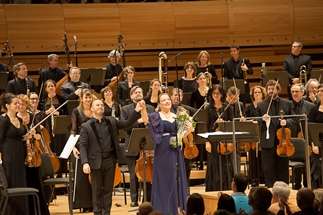|
Back
Dorothea Röschmann Enthralls Montreal Audience Montreal
Maison symphonique de Montréal, Place des Arts
09/20/2015 -
Johann Sebastian Bach: Komm, süsser Tod, BWV 478 (orch. Leopold Stokowski)
Gustav Mahler: Rückert Lieder
Anton Bruckner: Symphony No. 2 in C minor (1877 version)
Dorothea Röschmann (soprano)
Orchestre Métropolitain, Yannick Nézet-Séguin (conductor)

Y. Nézet-Séguin, D. Röschmann
(© Orchestre Métropolitain/Thierry Quenette)
Montreal’s two leading orchestras seem to have a penchant for opening their seasons on a death note. Last year the Orchestre symphonique de Montréal began their season with Berlioz’s Roméo et Juliette. This year it was a concert version of Debussy’s Pelléas et Mélisande. On Sunday afternoon the Orchestre Métropolitain inauspiciously began its 35th season with J. S. Bach’s Komm, süsser Tod (Come, sweet death).
In his opening remarks Nézet-Séguin noted that he became conductor of the Philadelphia Orchestra 100 years after Stokowski’s appointment in 1912, and felt he had a mission to honor the conductor by playing his Bach transcriptions. I don’t think Stokowski would have been thrilled by today’s performance. It was, to be generous, Stokowski “Lite”. Restrained and hushed to the breaking point, it lacked the velvety gravitas, elasticity and tension of Stokowski’s conducting.
German soprano Dorothea Röschmann made up for this with a luminous performance of Mahler’s five Rückert Lieder. Blessed with a pure, bell-like upper register, without a touch of vibrato, Ms Röschmann brought nuance, color and delicacy to the softer passages and power and conviction to the climatic high notes, especially in Um Mitternacht.
Bruckner’s Symphony No. 2 failed to ignite. This was being recorded as part of their complete cycle on the Atma label. The Orchestra seemed under-rehearsed. The strings produced a smooth, well-shaped sound, especially in the first movement and slower passages, but the brass, apart from the overbearing trombones, suffered from uneven entries and a lack of confidence, with the two timid trumpets seemingly lost in the background. Solos from principal horn Louis-Philippe Marsolais, however, were spot on throughout, and the work from tubist Alain Cazes (including the descending scale in the aforementioned Um Mitternacht) outstanding. The woodwinds also delivered some fine solos.
The performance was marred by the lack of attention to dynamics. There was often little or no distinction among differences in piano, pianissimo and pianissisimo, and at times crescendos and decrescendos were ignored. More importantly, however, Nézet-Séguin virtually turned a blind eye to the composer’s famous controversial pauses. Overall, the performance lacked the unifying architectural line so essential to Bruckner.
Nézet-Séguin’s contract with the Orchestre Métropolitain has been renewed through to the 2020-21 season.
Earl Arthur Love
|